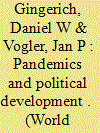| Srl | Item |
| 1 |
ID:
175280


|
|
|
|
|
| Summary/Abstract |
Research on clientelism emphasizes the use of brokers to mobilize voters. To utilize these agents efficiently, politicians must learn about brokers’ relative abilities and allocate scarce resources accordingly. Drawing upon a hand-coded dataset based on the archives of Gustavo Capanema, a powerful mid-twentieth-century congressman from Minas Gerais, Brazil, this paper offers the first direct evidence of such learning dynamics. The analysis concentrates on Brazil’s pre-secret ballot era, a time when measuring broker performance was particularly straightforward. Consistent with theories of political learning, the data demonstrate that resource flows to local machines were contingent on the deviation between actual and expected votes received in previous elections. Moreover, given politicians’ ability to discern mobilization capacity, payments to brokers were highly effective in bringing out the vote.
|
|
|
|
|
|
|
|
|
|
|
|
|
|
|
|
| 2 |
ID:
179767


|
|
|
|
|
| Summary/Abstract |
Do pandemics have lasting consequences for political behavior? The authors address this question by examining the consequences of the deadliest pandemic of the last millennium: the Black Death (1347–1351). They claim that pandemics can influence politics in the long run if the loss of life is high enough to increase the price of labor relative to other factors of production. When this occurs, labor-repressive regimes, such as serfdom, become untenable, which ultimately leads to the development of proto-democratic institutions and associated political cultures that shape modalities of political engagement for generations. The authors test their theory by tracing the consequences of the Black Death in German-speaking Central Europe. They find that areas hit hardest by that pandemic were more likely to adopt inclusive political institutions and equitable land ownership patterns, to exhibit electoral behavior indicating independence from landed elite influence during the transition to mass politics, and to have significantly lower vote shares for Hitler’s National Socialist Party in the Weimar Republic’s fateful 1930 and July 1932 elections.
|
|
|
|
|
|
|
|
|
|
|
|
|
|
|
|